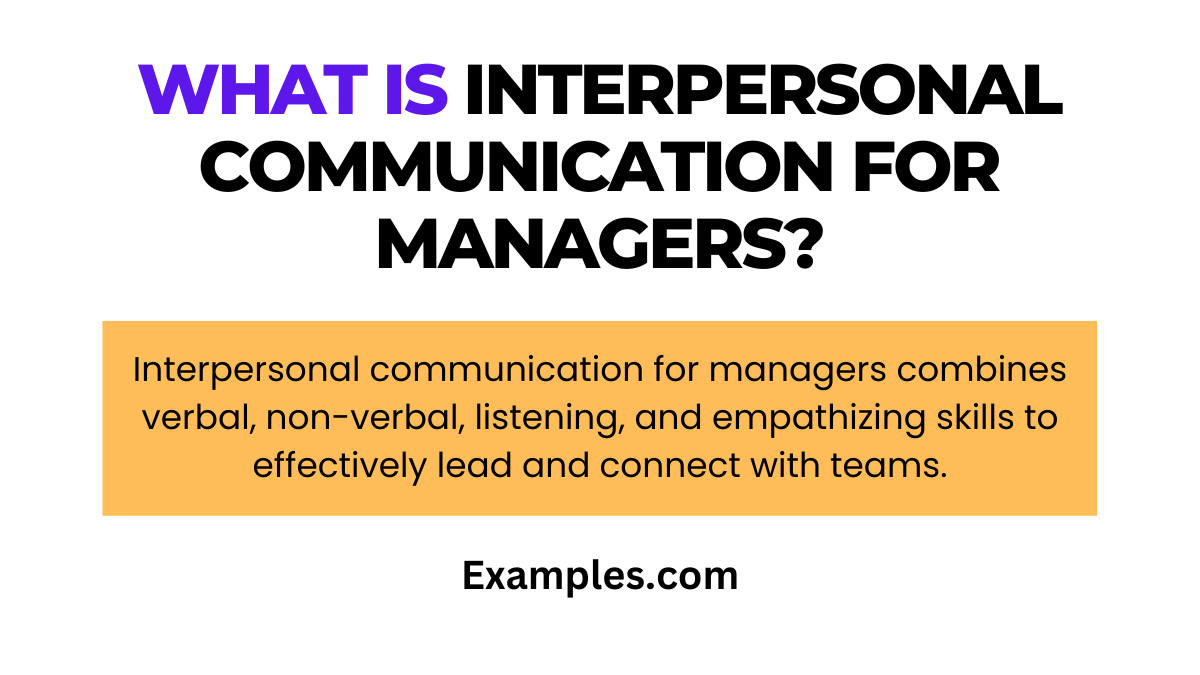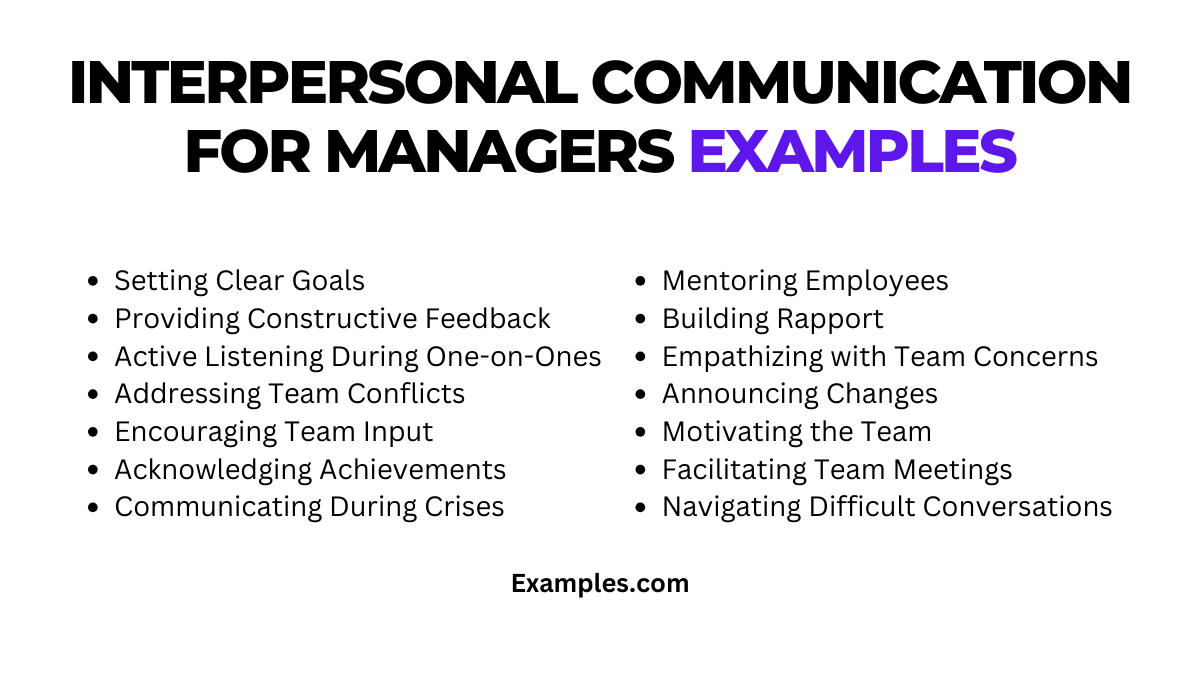14+ Interpersonal Communication for Managers Examples
Interpersonal communication for managers is a critical skill encompassing oral communication, active listening, and non-verbal cues. It involves effectively conveying messages, motivating team members, resolving conflicts, and building strong work relationships. For managers, mastering these communication skills is essential for team cohesion, productivity, and workplace harmony. Effective communication in management leads to better understanding, enhanced teamwork, and overall organizational success. This skill set is indispensable for any manager seeking to lead effectively in today’s dynamic work environment.
What is Interpersonal Communication for Managers?

Interpersonal communication for managers refers to the techniques and skills used in effectively communicating with team members and colleagues. It involves the use of both verbal and non-verbal communication methods to instruct, guide, motivate, and understand employees. This type of communication is fundamental in management as it helps in building trust, fostering a positive work environment, and ensuring clear understanding of goals and expectations. It’s a blend of listening, speaking, and empathizing skills essential for effective leadership.
What is the Best Example of Interpersonal Communication for Managers?

The best example of interpersonal communication for managers is engaging in open and transparent dialogues with team members. This includes providing clear instructions, offering constructive feedback, actively listening to employee concerns, and motivating the team towards common goals. For instance, conducting regular team meetings where managers encourage open discussions, address team challenges, and celebrate achievements exemplifies effective managerial communication. Such interactions not only guide teams but also foster a sense of belonging and mutual respect.
15 Interpersonal Communication for Managers Examples

Interpersonal communication for managers is a multifaceted skill that involves more than just conveying messages; it’s about connecting with team members, building trust, and fostering a positive work environment. Effective communication in management is marked by clarity, empathy, active listening, and adaptability. These examples showcase various scenarios where managers can apply interpersonal communication skills, illustrating how effective communication can lead to improved team dynamics, enhanced productivity, and better employee engagement.
- Setting Clear Goals: “Our target for this quarter is to increase sales by 15%.” Clearly communicating objectives to the team.
- Providing Constructive Feedback: “Your report was comprehensive, but adding more data analysis could enhance its impact.” Offering specific suggestions for improvement.
- Active Listening During One-on-Ones: “I want to understand your perspective on this issue.” Showing genuine interest in employee viewpoints.
- Addressing Team Conflicts: “Let’s discuss this issue and find a solution that works for everyone.” Facilitating conflict resolution.
- Encouraging Team Input: “What are your thoughts on improving our workflow?” Inviting ideas and participation from team members.

- Acknowledging Achievements: “Great job on the project, your hard work really paid off!” Recognizing and appreciating team efforts.
- Communicating During Crises: “Here’s the plan to navigate our current challenge.” Providing clear guidance during difficult times.
- Mentoring Employees: “Let me share some strategies that might help you with this task.” Offering advice and support.
- Building Rapport: “How was your weekend?” Engaging in small talk to build relationships.
- Empathizing with Team Concerns: “I understand why this change might be worrying. Let’s explore it together.” Showing understanding and support.
- Announcing Changes: “We are going to implement a new system to improve efficiency.” Clearly explaining organizational changes.

- Motivating the Team: “I believe in our ability to meet our goals. Let’s give our best!” Inspiring and energizing the team.
- Facilitating Team Meetings: “Today, we’ll focus on finalizing our strategy for the upcoming campaign.” Effectively leading and directing meetings.
- Navigating Difficult Conversations: “We need to talk about your recent performance and how we can improve it.” Approaching sensitive topics with tact.
- Celebrating Milestones: “We hit our target! This success is a testament to our teamwork.” Marking and celebrating team successes
Elements of Interpersonal Communication for Managers
Effective interpersonal communication for managers encompasses various elements essential for successful team leadership and management.
- Clarity: Making sure that all communication is clear and straightforward.
- Active Listening: Focusing attentively on what team members communicate.
- Empathy: Understanding and valuing team members’ feelings and viewpoints.
- Feedback: Giving and receiving constructive feedback to and from employees.
- Non-Verbal Communication: Effectively using body language and facial expressions.
- Conflict Resolution: Skillfully addressing and resolving workplace conflicts.
- Persuasion: Influencing and motivating team members effectively.
- Adaptability: Adjusting communication styles to fit various situations and individuals.
Goals of Interpersonal Communication for Managers
The goals of interpersonal communication for managers are pivotal for creating a positive and efficient work environment.
- Building Trust: Establishing a strong sense of trust within the team.
- Enhancing Team Cohesion: Promoting teamwork and unity among staff.
- Improving Team Morale: Boosting the overall spirit and motivation of the team.
- Facilitating Clear Understanding: Ensuring clarity in the comprehension of tasks and objectives.
- Encouraging Feedback and Ideas: Welcoming innovative thoughts and feedback.
- Managing Conflicts: Effectively resolving disputes and misunderstandings.
- Developing Employee Skills: Contributing to the growth and skill enhancement of team members.
- Achieving Organizational Goals: Aligning team efforts with the company’s broader objectives.
Effective Interpersonal Communication for Managers
For managers, effective interpersonal communication is key to leadership and team success.
- Consistent Messaging: Maintaining uniformity in communication to prevent misunderstandings.
- Active Engagement: Meaningfully interacting with team members.
- Cultural Sensitivity: Respecting and acknowledging diverse cultural backgrounds.
- Transparency: Openly sharing necessary information with the team.
- Encouraging Participation: Inviting employees to contribute their ideas and opinions.
- Assertiveness: Clearly conveying needs and expectations.
- Responsiveness: Quickly and effectively addressing team concerns and inquiries.
- Inspirational Communication: Motivating the team through positive words and actions.
Why is Interpersonal Communication Important for Managers?
Interpersonal communication is crucial for managers, impacting team dynamics and the achievement of organizational goals.
- Enhances Leadership Effectiveness: Integral to robust and impactful leadership.
- Facilitates Problem-Solving: Crucial for identifying and addressing workplace issues.
- Strengthens Team Relationships: Builds productive and positive team connections.
- Improves Decision Making: Enables gathering diverse perspectives for well-informed decisions.
- Boosts Employee Engagement: Encourages higher commitment and involvement from team members.
- Promotes a Healthy Work Environment: Contributes to creating a supportive and open workplace.
- Drives Performance and Productivity: Influences the efficiency and output of the team.
- Supports Change Management: Essential for leading teams through organizational changes and developments.
Mastering interpersonal communication is essential for managers, playing a vital role in leadership effectiveness and organizational success. This guide underscores the importance of various communication skills and practices, highlighting how they contribute to effective management and team dynamics. For managers, these skills are crucial not just for information dissemination but also for building relationships, inspiring teams, and driving progress, proving indispensable in the professional sphere.



